Mercedes EQV vs Hyundai Inster – Differences & prices compared
Compare performance, boot space, consumption and price in one view.
Find out now: which car is the better choice for you – Mercedes EQV or Hyundai Inster?
The Mercedes EQV (Bus) comes with a Electric engine and Automatic transmission. In comparison, the Hyundai Inster (SUV) features a Electric engine with Automatic transmission.
When it comes to boot capacity, the Mercedes EQV offers 1410 L, while the Hyundai Inster provides 280 L – depending on how much space you need. If you’re looking for more power, decide whether the 204 HP of the Mercedes EQV or the 115 HP of the Hyundai Inster suits your needs better.
In terms of consumption, the values are 27.10 kWh per 100 km for the Mercedes EQV, and 14.30 kWh for the Hyundai Inster.
Price-wise, the Mercedes EQV starts at 51300 £, while the Hyundai Inster is available from 20500 £. Compare all the details and find out which model fits your lifestyle best!
Mercedes EQV
The Mercedes-Benz EQV stands out as a versatile electric vehicle combining luxury with practicality, making it an ideal choice for environmentally conscious families. With its spacious interior and sleek design, it offers a premium driving experience that aligns with the brand's reputation for quality and innovation. As a sustainable option in the realm of people carriers, it exhibits the perfect balance between cutting-edge technology and everyday usability.
details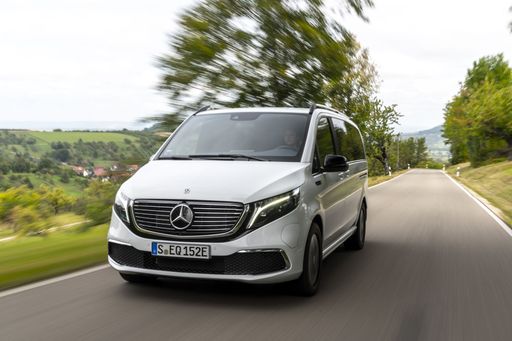 @ group-media.mercedes-benz.com
@ group-media.mercedes-benz.com
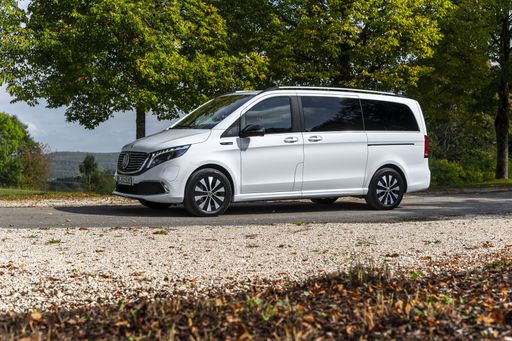 @ group-media.mercedes-benz.com
@ group-media.mercedes-benz.com
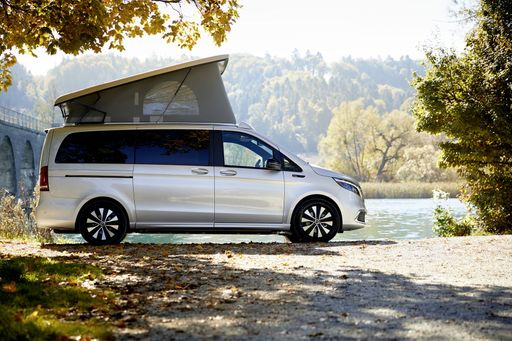 @ group-media.mercedes-benz.com
@ group-media.mercedes-benz.com
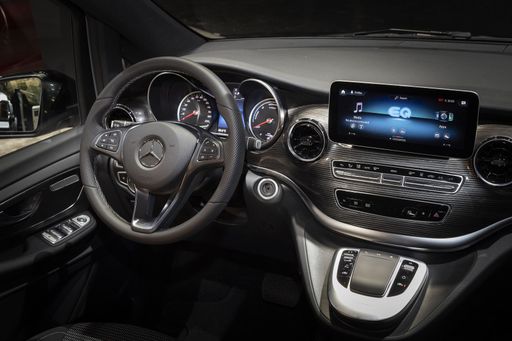 @ group-media.mercedes-benz.com
@ group-media.mercedes-benz.com
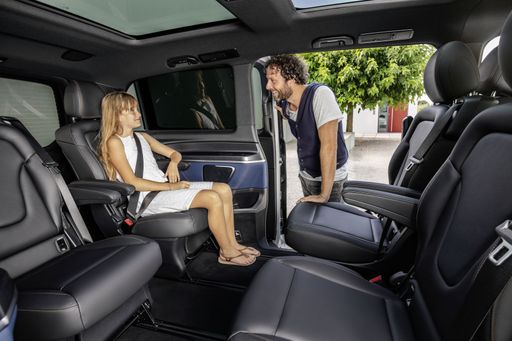 @ group-media.mercedes-benz.com
@ group-media.mercedes-benz.com
Hyundai Inster
The Inster has quickly captured the attention of automotive enthusiasts with its striking design and dynamic performance. This model seamlessly blends advanced technology with comfort, making it an ideal choice for both daily commutes and adventurous road trips. With its spacious interior and innovative features, the Inster promises an exhilarating driving experience that doesn’t compromise on practicality.
details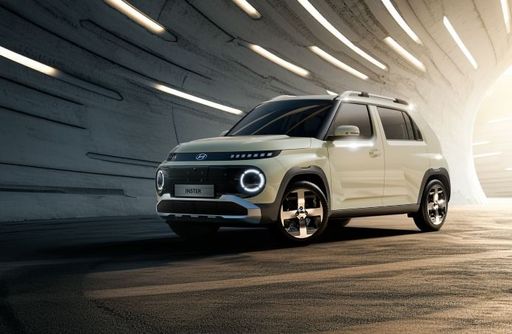 @ hyundai.news
@ hyundai.news
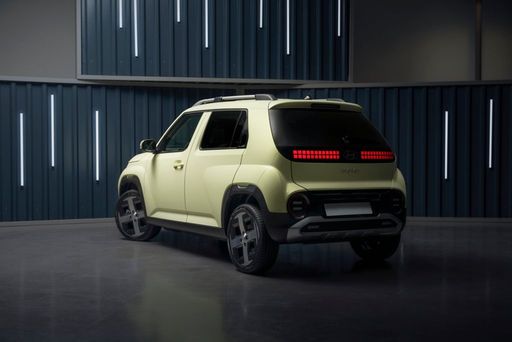 @ hyundai.news
@ hyundai.news
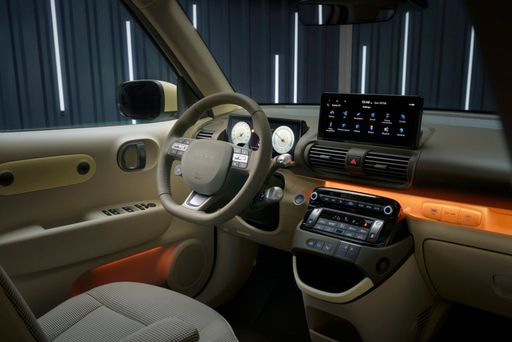 @ hyundai.news
@ hyundai.news

|

|
|
|
|
Costs and Consumption |
|
|---|---|
|
Price
51300 - 54900 £
|
Price
20500 - 25800 £
|
|
Consumption L/100km
-
|
Consumption L/100km
-
|
|
Consumption kWh/100km
27.1 - 27.4 kWh
|
Consumption kWh/100km
14.3 - 15.1 kWh
|
|
Electric Range
244 - 365 km
|
Electric Range
327 - 370 km
|
|
Battery Capacity
60 - 90 kWh
|
Battery Capacity
42 - 49 kWh
|
|
co2
0 g/km
|
co2
0 g/km
|
|
Fuel tank capacity
-
|
Fuel tank capacity
-
|
Dimensions and Body |
|
|---|---|
|
Body Type
Bus
|
Body Type
SUV
|
|
Seats
6
|
Seats
4
|
|
Doors
5
|
Doors
5
|
|
Curb weight
2666 - 2863 kg
|
Curb weight
1380 - 1433 kg
|
|
Trunk capacity
1030 - 1410 L
|
Trunk capacity
238 - 280 L
|
|
Length
5140 - 5370 mm
|
Length
3825 - 3845 mm
|
|
Width
1928 mm
|
Width
1610 mm
|
|
Height
1920 - 1923 mm
|
Height
1575 - 1610 mm
|
|
Payload
637 - 834 kg
|
Payload
317 - 357 kg
|
Engine and Performance |
|
|---|---|
|
Engine Type
Electric
|
Engine Type
Electric
|
|
Transmission
Automatic
|
Transmission
Automatic
|
|
Transmission Detail
-
|
Transmission Detail
-
|
|
Drive Type
Front-Wheel Drive
|
Drive Type
Front-Wheel Drive
|
|
Power HP
204 HP
|
Power HP
97 - 115 HP
|
|
Acceleration 0-100km/h
10.3 - 12.1 s
|
Acceleration 0-100km/h
10.6 - 11.7 s
|
|
Max Speed
140 km/h
|
Max Speed
140 - 150 km/h
|
|
Torque
365 Nm
|
Torque
147 Nm
|
|
Number of Cylinders
-
|
Number of Cylinders
-
|
|
Power kW
150 kW
|
Power kW
71 - 85 kW
|
|
Engine capacity
-
|
Engine capacity
-
|
General |
|
|---|---|
|
Model Year
2024
|
Model Year
2025
|
|
CO2 Efficiency Class
A
|
CO2 Efficiency Class
A
|
|
Brand
Mercedes-Benz
|
Brand
Hyundai
|
Mercedes EQV
Introduction to the Mercedes-Benz EQV
The Mercedes-Benz EQV is the latest addition to the luxury automotive lineup, offering a unique blend of sustainability, performance, and innovative design. This all-electric MPV (multi-purpose vehicle) is designed to cater to the demands of modern family life and business travel, making zero-emission driving a refined and effortless experience.
Performance and Efficiency
At the heart of all EQV models is a robust electric motor producing 204 PS, or 150 kW, which ensures responsive acceleration and a smooth driving experience. With the option of either a 60 kWh or 90 kWh battery capacity, the EQV offers an impressive range of between 244 to 365 kilometres on a single charge, depending on your chosen configuration.
The electric motor's torque of 365 Nm, combined with a state-of-the-art automatic transmission system, ensures seamless gear shifts and optimal energy efficiency. The EQV boasts a consumption of 27.1 to 27.4 kWh per 100 kilometres, making it one of the most efficient vehicles in its class.
Innovative Technology
Mercedes-Benz has equipped the EQV with cutting-edge technology to enhance both driver convenience and passenger comfort. The integrated MBUX (Mercedes-Benz User Experience) system is a highlight, offering voice control and a high-resolution display that keeps drivers connected and informed at all times.
Furthermore, the EQV features advanced driver assistance systems designed to enhance safety and ease of driving. These include Active Brake Assist, Attention Assist, and Crosswind Assist, creating an optimised driving experience regardless of road conditions.
Design and Comfort
The Mercedes-Benz EQV retains the sleek and luxurious design language that is synonymous with the brand. With a length ranging from 5140 to 5370 mm, a width of 1928 mm, and a height of up to 1923 mm, the EQV provides ample space for passengers and luggage, comfortably seating up to six passengers.
The interior is thoughtfully designed with premium materials and flexible seating arrangements, allowing for a rear-seat configuration that suits varied needs, whether for family outings or business commutes. The EQV also offers a spacious boot capacity of 1030 to 1410 litres.
Environmental Impact and CO2 Efficiency
As part of Mercedes-Benz's commitment to sustainability, the EQV has an impressive CO2 efficiency class of 'A'. With zero CO2 emissions during operation, it represents an environmentally-friendly alternative for those seeking luxury without compromise.
Conclusion
The Mercedes-Benz EQV combines luxury, performance, and sustainability, setting a new benchmark for electric vehicles in the MPV segment. Whether for family or business, its advanced technology, thoughtful design, and eco-friendly credentials make it a compelling choice for discerning drivers.
Hyundai Inster
The automotive landscape continues to evolve, and at the forefront of this transformation is the Hyundai Inster, a dynamic model set to impress electric vehicle enthusiasts. As a compact SUV, the Inster embodies a blend of innovative technology, user-friendly features, and an eco-conscious design, making it a contender in the burgeoning electric vehicle market.
Powertrain and Performance
The Hyundai Inster is powered by an efficient electric drivetrain, offering two main battery options: a 42 kWh and a 49 kWh version. These options translate to power outputs of 97 HP and 115 HP, respectively, allowing drivers to choose based on their performance needs. The Inster accelerates from 0 to 100 km/h in 11.7 seconds for the 42 kWh variant, while the more powerful 49 kWh model reaches the same speed in an impressive 10.6 seconds, showcasing Hyundai's commitment to delivering engaging performance.
Range and Efficiency
One of the standout features of the Inster is its electric range. The 42 kWh model provides a range of 327 km, while the 49 kWh variants extend the range to 360 km and 370 km. This remarkable efficiency is complemented by consumption figures of 14.3 kWh/100 km for the 42 kWh variant and 14.9 kWh/100 km for the 49 kWh options. These figures ensure that the Inster is not only suited for city driving but also capable of handling longer journeys with ease.
Dynamic Design and Comfortable Interior
Aesthetically, the Hyundai Inster boasts a sleek and modern look, featuring a compact SUV profile that is both sporty and practical. The dimensions, measuring between 3825 mm and 3845 mm in length, with a width of 1610 mm and heights ranging from 1575 mm to 1610 mm, contribute to its spacious and comfortable cabin. The interior accommodates up to four passengers, making it an ideal choice for small families or couples.
Innovative Features
The Inster incorporates advanced technology geared towards enhancing the driving experience. Its automatic transmission, utilizing a reduction gearbox, ensures seamless gear shifts. Additionally, drivers will appreciate the array of smart features designed for convenience and connectivity, including advanced infotainment systems and driver assistance technologies.
Sustainability Credentials
Hyundai is dedicated to sustainability, and the Inster is a testament to this philosophy. With a carbon footprint of zero emissions, the Inster falls into the A CO2 efficiency class, making it a responsible choice for eco-conscious consumers. The absence of traditional emissions positions the Inster not only as an economical option but also as a proactive step towards reducing our environmental impact.
Conclusion
The Hyundai Inster stands out as a versatile and innovative solution in the electric vehicle segment. With a balanced approach to performance, efficiency, and sustainability, it caters to the modern driver’s needs and reflects the automotive industry's shift towards electrification. The future looks bright for the Inster, as Hyundai continues to pave the way for greener driving experiences.
The prices and data displayed are estimates based on German list prices and may vary by country. This information is not legally binding.
